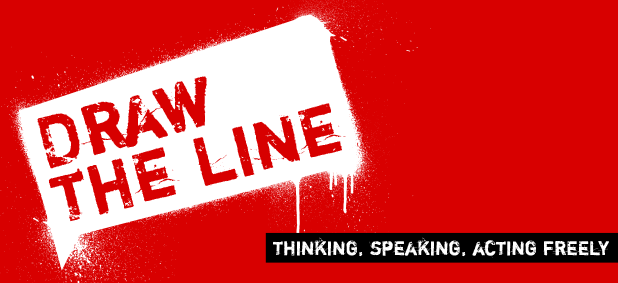17 Jun 2014 | Volume 43.02 Summer 2014
[vc_row][vc_column][vc_custom_heading text=”In the summer issue of Index on Censorship magazine, we include a special report: Brick by brick, freedom 25 years after the fall of the Berlin Wall.”][vc_row_inner][vc_column_inner width=”1/2″][vc_column_text]
As Europe prepares for the anniversary of the wall’s demolition in November, Index on Censorship looks at how the continent has changed. Author Irena Maryniak explores the idea of a new divide that has formed further east. Polish journalist Konstanty Gebert looks at how Poland’s media came out from the underground and lost its voice.
[/vc_column_text][/vc_column_inner][vc_column_inner width=”1/2″][vc_single_image image=”58030″ img_size=”full”][/vc_column_inner][/vc_row_inner][vc_column_text]
Award-winning German writer Regula Venske shows how Germany has tackled its identity issues through crime fiction; and Helen Womack reports from Moscow on the fears of a new Cold War. We also give voice to “Generation Wall” – the young people who have grown up in a free eastern Europe.
When the wall came down in 1989, there were discussions in the Index office about whether our battles were over. Sadly, we all know there was no universal end to censorship on that day. This issue also shares stories of the continuing fight for free expression worldwide, from a scheme to fund investigative journalism in Tanzania to an ambitious crowdsourcing project in Syria.
Also in this issue:
• Dame Janet Suzman looks at censorship of South African theatre on the 20th anniversary of South African democracy
• Jim Al-Khalili shares his thoughts on threats to science research and debate
• Ex BBC World Service boss Richard Sambrook goes head-to-head with Bruno Torturra, from Brazil’s Mídia Ninja, to debate the future of big media
Plus:
• Two new short stories – exclusive to Index – from Costa first novel winner Christie Watson and Turkish novelist Kaya Genç
[/vc_column_text][/vc_column][/vc_row][vc_row][vc_column][vc_custom_heading text=”SPECIAL REPORT: BRICK BY BRICK” css=”.vc_custom_1483610192923{margin-right: 0px !important;margin-left: 0px !important;border-bottom-width: 1px !important;padding-top: 15px !important;padding-bottom: 15px !important;border-bottom-color: #455560 !important;border-bottom-style: solid !important;}”][vc_column_text]
Freedom 25 years after the fall
[/vc_column_text][/vc_column][/vc_row][vc_row][vc_column][vc_custom_heading text=”IN FOCUS” css=”.vc_custom_1481731813613{margin-right: 0px !important;margin-left: 0px !important;border-bottom-width: 1px !important;padding-top: 15px !important;padding-bottom: 15px !important;border-bottom-color: #455560 !important;border-bottom-style: solid !important;}”][vc_column_text]
[/vc_column_text][/vc_column][/vc_row][vc_row][vc_column][vc_custom_heading text=”CULTURE” css=”.vc_custom_1481731777861{margin-right: 0px !important;margin-left: 0px !important;border-bottom-width: 1px !important;padding-top: 15px !important;padding-bottom: 15px !important;border-bottom-color: #455560 !important;border-bottom-style: solid !important;}”][vc_column_text]
[/vc_column_text][/vc_column][/vc_row][vc_row][vc_column][vc_custom_heading text=”COLUMNS” css=”.vc_custom_1481732124093{margin-right: 0px !important;margin-left: 0px !important;border-bottom-width: 1px !important;padding-top: 15px !important;padding-bottom: 15px !important;border-bottom-color: #455560 !important;border-bottom-style: solid !important;}”][vc_column_text]
[/vc_column_text][/vc_column][/vc_row][vc_row][vc_column][vc_custom_heading text=”END NOTE” css=”.vc_custom_1481880278935{margin-right: 0px !important;margin-left: 0px !important;border-bottom-width: 1px !important;padding-top: 15px !important;padding-bottom: 15px !important;border-bottom-color: #455560 !important;border-bottom-style: solid !important;}”][vc_column_text]
[/vc_column_text][/vc_column][/vc_row][vc_row][vc_column][vc_custom_heading text=”SUBSCRIBE” css=”.vc_custom_1481736449684{margin-right: 0px !important;margin-left: 0px !important;border-bottom-width: 1px !important;padding-bottom: 15px !important;border-bottom-color: #455560 !important;border-bottom-style: solid !important;}”][vc_column_text]Index on Censorship magazine was started in 1972 and remains the only global magazine dedicated to free expression. Past contributors include Samuel Beckett, Gabriel García Marquéz, Nadine Gordimer, Arthur Miller, Salman Rushdie, Margaret Atwood, and many more.[/vc_column_text][vc_row_inner][vc_column_inner width=”1/2″][vc_single_image image=”76572″ img_size=”full”][/vc_column_inner][vc_column_inner width=”1/2″][vc_column_text]In print or online. Order a print edition here or take out a digital subscription via Exact Editions.
Copies are also available at the BFI, the Serpentine Gallery, MagCulture, (London), News from Nowhere (Liverpool), Home (Manchester), Calton Books (Glasgow) and on Amazon. Each magazine sale helps Index on Censorship continue its fight for free expression worldwide.
 SUBSCRIBE NOW[/vc_column_text][/vc_column_inner][/vc_row_inner][/vc_column][/vc_row]
SUBSCRIBE NOW[/vc_column_text][/vc_column_inner][/vc_row_inner][/vc_column][/vc_row]
12 Jun 2014 | Americas, Brazil, News and features
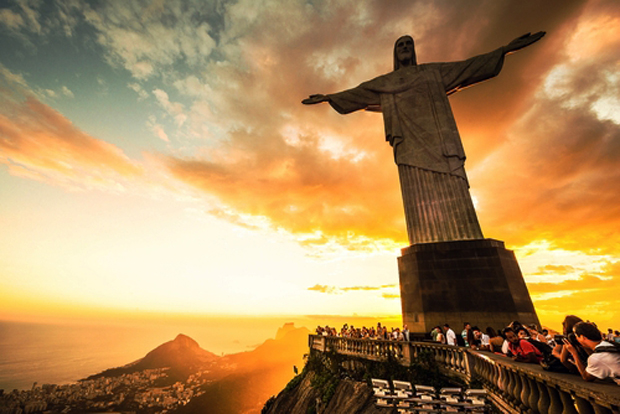
(Image: Ksenia Ragozina/Shutterstock)
World Cup time! Hurray! An entire month of football! Rejoice as the pubs stay open late for weirdly timed matches! Gasp at your workmates’ expertise on Iran’s deployment of a false 9! Repeatedly smash yourself in the face with your iPad as you read yet another article by a broadsheet columnist complaining that people don’t pay as much attention to literary fiction as they do to sport!
While the competition officially kicks off tonight, the Brazilians, or, specifically, the archdiocese of Rio have dived in with an early tackle, reportedly threatening to sue Italian broadcaster RAI for an advert showing Rio’s famous Christ The Redeemer statue wearing the Jersey of Italy’s Azzurri.
Suing for what, exactly, is not clear. The church’s lawyer, Rodrigo Grazioli, has been quoted as saying “The Archdiocese is deeply offended. It’s as if Brazilian TV were to make a commercial in which mulatto girls engaged in lewd behaviour with the gladiators of the Colosseum.”
Leaving aside the bizarrely specific and racist mention of “mulatto girls”, and the fact that people involved with churches have to make absolutely everything, ever, about “lewd behaviour”, it’s still not clear what the exact complaint is. Is it the suggestion that the colossal statue might support Italy? That Jesus himself might support Italy? Is this about putting any jersey at all on Jesus, or specifically an Italian one? Is there something specifically blasphemous about suggesting that the Son of God is a catenaccio man?
Or is it something rather more prosaic, such as, say, the church claiming to hold copyright over the image of the statue?
If it is that, as the original O Globo newspaper report suggests, then Grazioli and his clients are being more than a little disingenuous in their outrage. If the issue is simply an objection to commercial usage of the image, than that’s what the complaint should be about.
So why the offended line? Why the suggestion of an insult to religion? Because, put simply, it works. Who wants to be offensive?
In Ireland this week, national broadcaster RTE refused to show a sketch as part of the Savage Eye sketch show. The sketch, now leaked on the web features a group of “wild nuns” ogling a muscular Jesus, in a spoof of Diet Coke ads of old. Comic David McSavage, the man responsible for the skit, has said the broadcaster is afraid of Ireland’s blasphemy laws; RTE says its own guidelines will not allow for “undue offence”.
I’m not even sure that, even if one was a supporter of laws against blasphemy, images of hunky Jesus, or Azzurri Jesus would necessarily count as blasphemous, at least not for Catholics.
On a panel on religious art a few years ago, I found myself simultaneously playing the role of token secularist and token Roman Catholic. The other panelists – art critics and Anglicans – were quite keen on abstraction in religious art. I found myself defending the more visceral, more Roman depictions of Jesus and God on the basis that the entire point of Jesus was his manifestation as human.
To ascribe certain human possibilities to him, such as lust, or even supporting a particular sports team, should not be considered transgressive; indeed I recall, in my youth, our parish priest would often offer up prayers for the local Gaelic football club, suggesting at least the possibility of partisanship. And the very fact that nuns are “brides of Christ” is suggestive of, well…
Catholicism doesn’t really have a problem with idolatry either. Catholics complaining about depictions of Christ do not have the same theological basis as Orthodox Sunni Muslims, who at least can point to some rules on portrayals (which is not to suggest that everyone should follow those rules). Catholics, with our brightly painted statues, sacred medals and all the rest, don’t really have a leg to stand on this one.
These squeals of “offence” are really demands for “respect”, in the Corleone sense. And since the Danish Muhammad cartoons, religions have been in a respect-based arms war. Every time you hear a conservative Christian moan that this or that comic or writer “wouldn’t say that about the Muslims”, remember, they are not praising their own faith’s humility, but condemning its timidity. The archdiocese of Rio is playing a version of this game with its claim to be offended by a Photoshopped football jersey. There’s no reason we should play along.
This article was published on June 12, 2014 at indexoncensorship.org
12 Jun 2014 | Cameroon, Iran, News and features, Nigeria, Russia
The 2014 World Cup in Brazil starts today, 32 nations preparing to battle it out across eight groups in the first stage of the tournament.
This year’s competition, like so many before it, comes with its designated group of death. For those not familiar with the lingo, it means the group containing the highest amount of strong teams. Or even more simply put, the group most difficult to progress from. (You can’t accuse the beautiful game of holding back on the melodrama).
Index has looked at the countries taking part in arguably the biggest show on earth, and put together our own group of death — the freedom of expression edition.
Cameroon
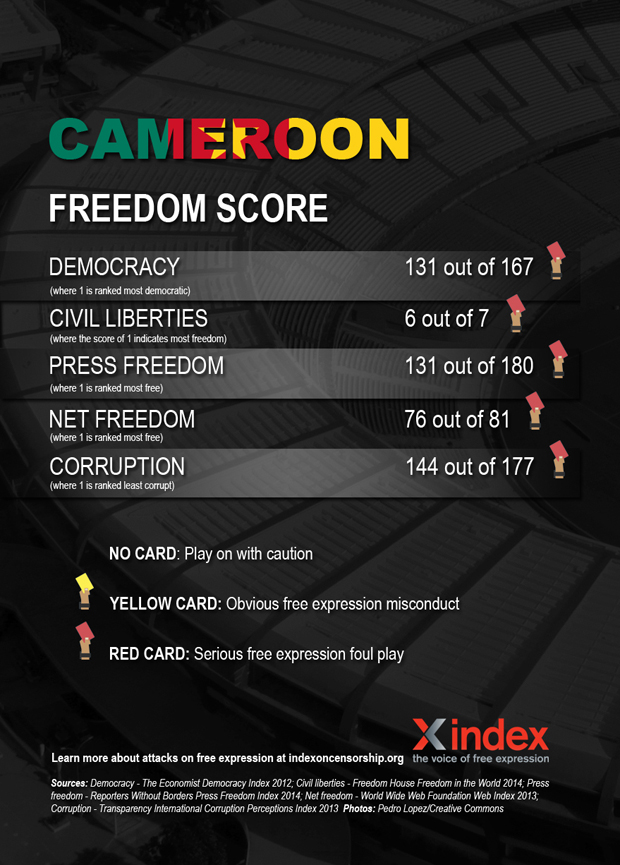
Cameroon — or the Indomitable Lions — have a solid track record in qualifying for the World Cup, having taken part seven time, more than any other African side. There were also the first African team to make it to the quarter final and are responsible for one of the most iconic moments in the tournament’s history. Their track record on free speech, however, is less impressive.
Freedom of expression is guaranteed in Cameroon’s constitution. Despite this, the government of Paul Biya — the country’s leader since 1982 — has been been accused numerous violations of free expression.
Large parts of the press are biased towards the ruling elite, while critical journalists face detainment, harassment and demands to reveal sources, among other things. Self censorship is widespread. In September 2013, 11 press outlets, including newspapers, radio stations and a TV station, were shut down for disrespecting “ethics and professional norms”. In 2010, former newspaper editor Germain Ngota, who had been investigating corruption allegations involving the state-run oil company, died in jail.
Freedom of assembly is often cracked down on. In 2012, former opposition presidential candidate Vincent-Sosthène Fouda and others were charged with “holding an unlawful demonstration”. The same year, security forces used tear against a crowd gathered to protest against Biya. In 2008, around 100 people were killed in clashes with police in anti-government riots.
Arts are not spared either. In 2013, Jean-Pierre Bekolo’s film Le President was banned in Cameroon because it discussed the end of Biya’s reign . In 2008, Lapiro de Mbanga, who criticised the constitutional change in term times that would allow Biya to stay in powers through song, was arrested.
Homosexuality is outlawed, and punishable by up to 14 years in prison. Human rights violations against LGBTI people, or those perceived to be, are “commonplace”. In July 2013, Eric Ohena Lembembe, director of the Cameroonian Foundation for AIDS (CAMFAIDS) was brutally murdered, in what friends suspect was an attack based on his pro-LGBTI advocacy.
Iran
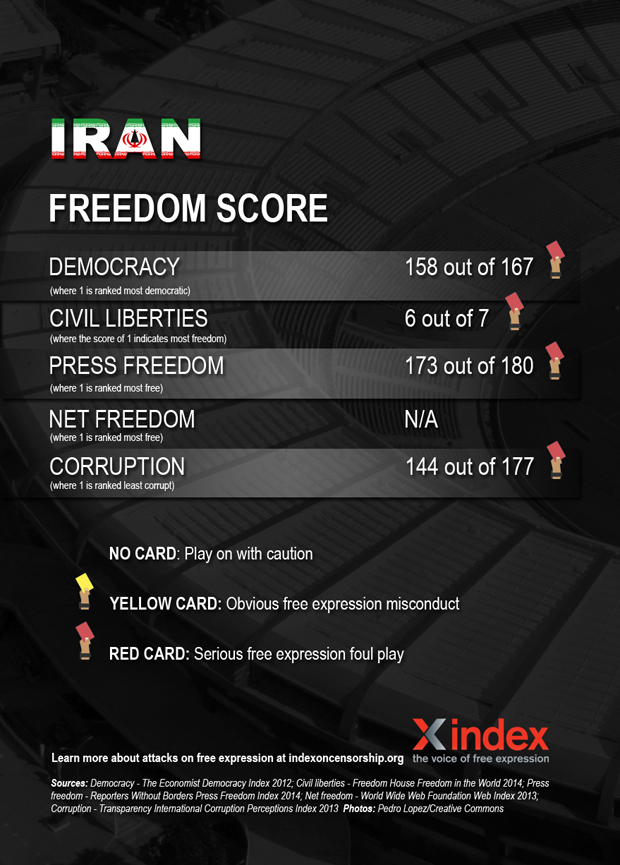
Team Melli will hope that their fourth appearance at the World Cup will see them progress from the group stages for the first time. When he was elected almost a year ago, there was hope that President Hassan Rouhani would be a progressive force within Iran. The results so far have been mixed.
Since coming into power, Rouhani has taken some steps to improve press freedom, such as withdrawing 50 motions against journalists, and lifting some restrictions on previously banned topics. However, the government still controls all TV and radio, and censorship and self-censorship is widespread. The latest figures put the number of jailed journalists in Iran at 35. In January 2013, a group of journalists were arrested for allegedly cooperating with “anti revolutionary” news outlets abroad. Journalists’ associations and civil society organisations that support freedom of expression have also been targeted.
The internet and social media played a significant part in publicising and documenting the protests that followed the 2009 election, which many Iranians believed was fraudulent. The regime has banned Facebook, YouTube, Twitter and, recently, Instagram. The lead-up to the 2013 elections saw Iranian leaders tightening access to the web, and silencing “negative” news. While Rouhani — seemingly an avid Twitter user — has indicated plans to relax web censorship, the country’s plans to launch a “national internet” are said to be going ahead.
In May, eight people were jailed on charges including blasphemy, propaganda against the ruling system, spreading lies insulting the country’s supreme leader Ayatollah Ali Khamenei on Facebook. Recently, a group of young people were arrested over a video posted of them singing and dancing along to the song “Happy”, which police called was a “vulgar clip” that had “hurt public chastity”. Some commentators believe the move was meant to intimidate Iranians and discourage online criticism.
Nigeria
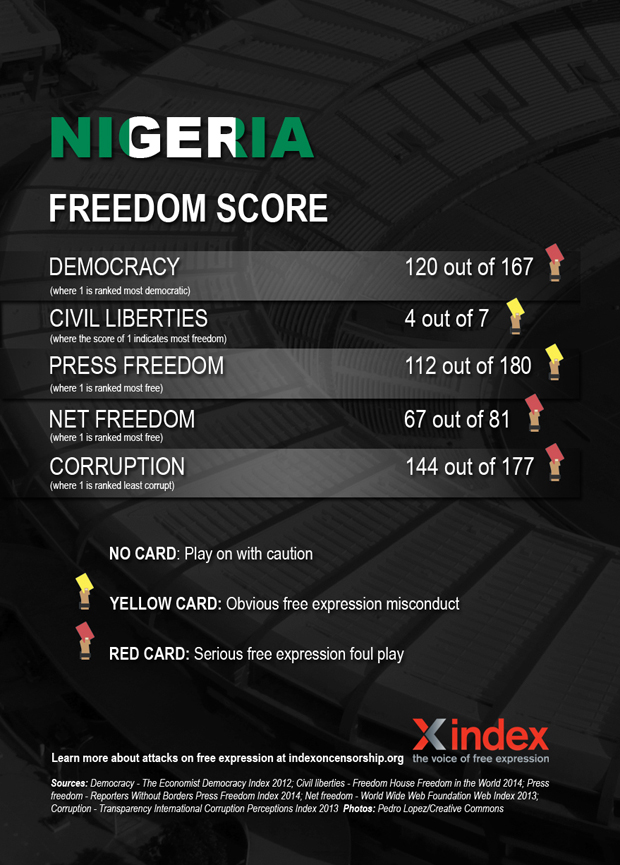
Brazil 2014 marks 20 years since Nigeria’s first outing at the World Cup, and the Super Eagles arrive at the tournament as reigning Africa Cup of Nations champions. The country’s leadership, however, is not a champion of free expression.
While parts of Nigerian media is controlled by people directly involved in politics, the country can also boast a lively independent media sector. However, journalists, especially those covering sensitive topics such as corruption or separatist and communal violence still face threats. Journalists have been arrested by security forces, and media outlets have been attacked by terrorists. Legal provisions such as sedition and criminal defamation also challenge press freedom. In 2011, a journalist was arrested over stories detailing alleged corruption in the Nigerian Football Federation.
The country’s freedom of information act was put in place in 2011. However, when human rights lawyer Rommy Mom tried to use the legislation to trace some 500 million of missing aid money allocated to his flood ravaged home state of Benue, he was met with threats from people connected to the state governor, and was forced to flee.
The Same Sex Marriage Prohibition Act 2013 outlawing gay marriage and relationships, was signed into law by President Goodluck Jonathan in January. The unpublished law makes it illegal for gay people to hold meetings, and outlaws the registration of homosexual clubs, organisations and associations. Those found to be participating in such acts face up to 14 years in jail.
Nigeria has come under international attention in recent months for abduction of the Chibok school girls by terrorist group Boko Haram. Among other things, Nigerians responded with the powerful #BringBackOurGirls campaign. In June however, authorities seemed to ban an offline protest against the kidnappings, before quickly backtracking. It is also worth noting that the Nigerian government has targeted journalists in their “war on terror”.
Russia
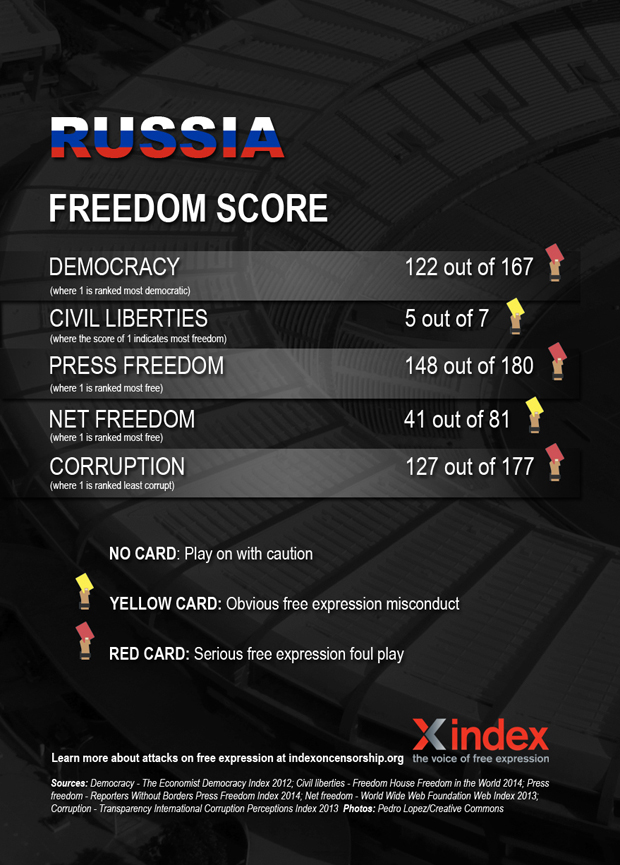
Team Sbornaya travel to Brazil in the knowledge that next time in the World Cup rolls around, they will be playing on home soil. Russia of course, recently hosted another international sporting event — the 2014 Winter Olympics. However, global attention did not improve the country’s poor record on freedom of expression. In fact, experts predicted a rise in censorship ahead of the Olympics.
Press freedom has long been under attack by Russian authorities, with TV news currently providing little beyond the official government line. In the last few months, the relatively well-respected TV channel RIA Novosti was liquidated following a decree by President Vladimir Putin, and replaced by a new press agency headed by a Kremlin-loyalist. In January, Dozhd, a popular independent TV channel was dropped by satellite and cable operators over a controversial survey. For the remaining critical journalists, Russia — one of the countries with the highest number of unpunished journalist murders — is a dangerous place to work.
The crackdown on the internet is widely believed to have started with the protests surrounding the elections securing Putin’s third term in power, organised partly through social media, but it has recently intensified. The Duma has adopted controversial amendments to an information law, targeting bloggers with blocking and fines for anything from failing to verify information posted, to using curse words. Also recently, the founder of “Russian Facebook” VKontakte says he was forced out, with the son of the head of Russia’s largest state-run media corporation predicted to take over as CEO. In 2013, the Duma approved legislation allowing immediate blocking of websites featuring content deemed “extremist”.
Public protests are discouraged through forceful responses by police, arrests, harsh fines and prison sentences. The country’s recent anti-gay legislation also pose a big threat to free expression and assembly. The ban on “promotion” of gay relationships, means that any form of expression deemed to be “gay propaganda” can be shut down. The law has also lead to physical attacks on Russia’s LGBT population.
An earlier version of this article stated that Brazil 2014 marks ten years since Nigeria’s first outing at the World Cup. This has been corrected.
This article was published on June 12, 2014 at indexoncensorship.org
![]() SUBSCRIBE NOW[/vc_column_text][/vc_column_inner][/vc_row_inner][/vc_column][/vc_row]
SUBSCRIBE NOW[/vc_column_text][/vc_column_inner][/vc_row_inner][/vc_column][/vc_row]

